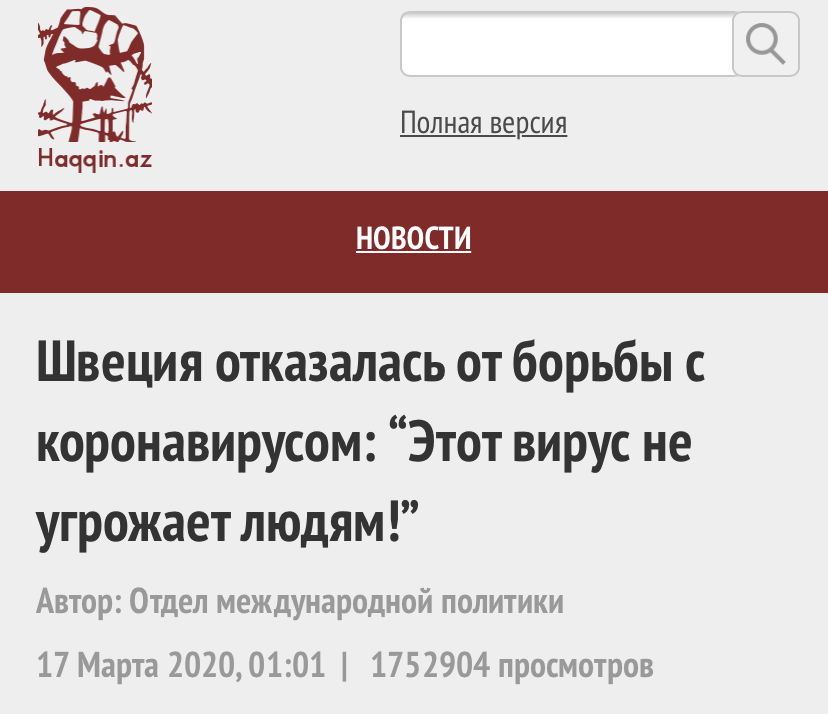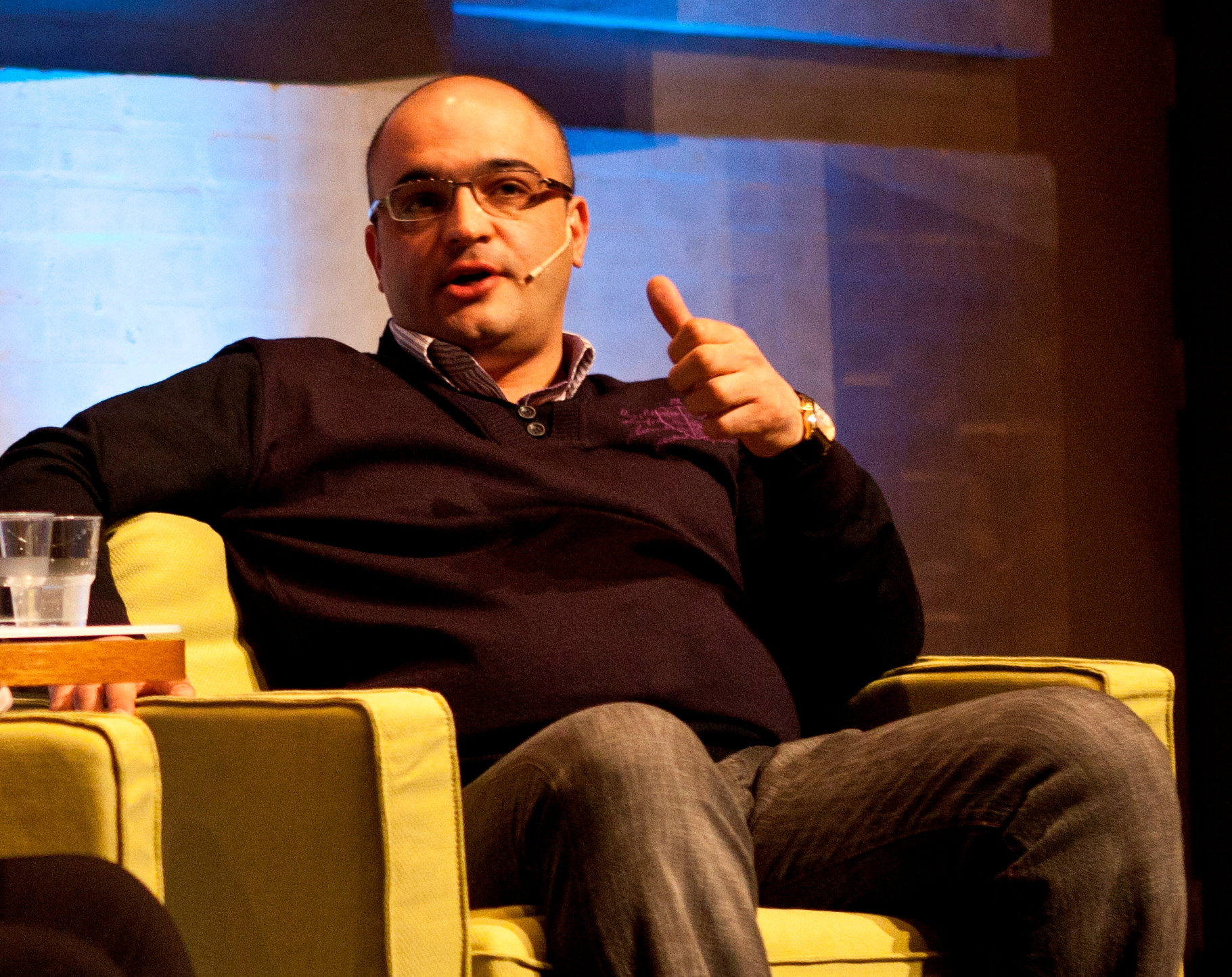 “Sweden Has Rejected the Fight against the Coronavirus”?
“Sweden Has Rejected the Fight against the Coronavirus”?
Martin Kragh, Head of the Russia and Eurasia Program at the Swedish Institute of International Affairs.
13 April 2020
The global pandemic caused by the coronavirus (Covid-19) has severely affected the global economy and confined millions of people across the European continent to their homes. Whereas most EU-countries opted for a lockdown strategy, closing schools, workplaces, and borders in March 2020, Swedish authorities implemented comparatively mild restrictions. The Swedish strategy has received strong disapproval and has been met with unease in international media, but there were also cautiously optimistic assessments which stated that a liberal approach to restrictions may be the more sustainable policy choice in a protracted pandemic.
Since the outbreak of the pandemic, Chinese and Russian state media outlets have been found to peddle conspiracy theories and disinformation about the Covid-19 virus. A few of the Chinese campaigns have targeted Sweden directly. The Swedish journalist Jojje Olson has documented how the official Chinese Communist Party newspaper, Global Times, accused Sweden of being “the first European country to openly surrender to the new corona pneumonia epidemic.” Chinese diplomats and party loyalists have turned to Twitter with accusations that the Swedish government is neglecting human rights – a concept otherwise rarely championed by Chinese state officials .

Major Russian language news outlets, such as Rossiia 24, RIA Novosti, Izvestiia and Rossiiskaia Gazeta, have provided skeptical and/or critical opinions about the Swedish approach to the Covid-19 pandemic. There is, however, a difference in comparison to the Chinese state media: Apart from more obscure news websites with a limited readership, mainstream reporting in Russian language news outlets has (to my knowledge) not targeted Sweden with overtly misleading or false claims regarding the Covid-19 pandemic.
There is, however, (at least) one notable exception to this rule. On 17 March, a Russian language Azeri news website, Haqqin.az, published an article that was read more than 1.7 million times within four weeks, and achieved more than 277,000 interactions on Facebook.* If this very high level of interaction is true, it means that the article is one of the most widely-read articles that has ever been published about Sweden in Russian-language media. Furthermore, it reappeared in an extension on other Russian and Ukrainian-language websites, such as Vazhno.ru, and was thus further amplified. The website Vazhno.ru targets Russians in the Baltic states and had about 7.5 million readers in February.
The article in question is titled “Sweden has rejected the fight against the coronavirus: ‘This virus poses no harm to people’.” Its main argument is that the Swedish authorities denied the risks associated with Corona-19 and that this explains why the Swedish government has refrained from “implementing any extraordinary measures whatsoever.” Furthermore, the article went on to sate that “Swedish scientists claim, in contrast to their colleagues in other countries, that the Coronavirus is… safe!”. In the last paragraph, the article concludes that “at stake are the life and health of millions of people.” No evidence is provided by the text’s anonymous author to support these alarmist statements.**
The article has more peculiar content. Notably, it references claims allegedly put forward on social media by the Polish-Swedish triathlon athlete Joanna Sołtysiak that all sport events in Sweden are taking place and that athletes from elsewhere should visit Sweden. A fact-checking site in Kazakhstan, which has drawn attention to the article, has shown that Sołtysiak has, in fact, never written or claimed anything of the kind. Furthermore, the article is illustrated with a seemingly unrelated picture of a group protesting the treatment of Falun Gong in China outside the Swedish royal castle.

An even more striking feature of the story should be highlighted. The website Haqqin.az is operated by Eynulla Fatullayev, a journalist who was named prisoner of conscience by Amnesty International in 2011. In 2013, however, Amnesty International publicly ceased their cooperation with Fatullayev, arguing that he had “misled the organization about the source of funding for a project he had requested Amnesty International’s involvement in.” Amnesty International also criticized statements on Haqqin.az, alleging that the website was used by the Azeri authorities to discredit European criticism of human rights violations in Azerbaijan.
The narrative that Sweden is denying the dangers of the Covid-19 pandemic seems to be strong and there are similarities between the fake narratives pushed in the Chinese and Russian stories about Sweden’s handling of the pandemic. One important difference is that the few Russian disinformation pieces that can be identified as being about Sweden target only a Russian-language audience, whereas the Chinese disinformation has been part of a broader international campaign to apparently deflect attention from China’s culpability for the ongoing pandemic. The article published by Haqqin.az is notable for four reasons: its large impact in the Russian-language media sphere; its obviously false content; it being published simultaneously by Russian and Ukrainian websites; and the fact that Haqqin.az has been previously tied to Azeri state-sponsored campaigns against the EU.
One remaining problem is how to properly assess the article’s reported levels of interaction. If (part of) the interaction was non-organic, i.e. manipulated, it is reasonable to assume that someone invested time and resources in order to amplify the article’s impact (for commercial, political or other reasons). This question is, however, outside the scope of this brief.
* According to Facebook’s analytical tool Crowdtangle, the article (per 8 April) has been shared about 59,500 times, has received 52,000 comments, and 165,000 “likes”. The website Haqqin.az does not systematically falsify information about readership on its meter, but that information is more difficult to verify. Notably, the article’s level of interaction on Twitter was very low.
** I am grateful to a Swedish journalist, who wishes to remain anonymous, for bringing the article published by haqqin.az to my attention.
